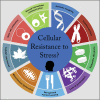Stress biology and aging mechanisms: toward understanding the deep connection between adaptation to stress and longevity
- PMID: 24833580
- PMCID: PMC4022128
- DOI: 10.1093/gerona/glu055
Stress biology and aging mechanisms: toward understanding the deep connection between adaptation to stress and longevity
Abstract
The rate of biological aging is modulated in part by genes interacting with stressor exposures. Basic research has shown that exposure to short-term stress can strengthen cellular responses to stress ("hormetic stress"). Hormetic stress promotes longevity in part through enhanced activity of molecular chaperones and other defense mechanisms. In contrast, prolonged exposure to stress can overwhelm compensatory responses ("toxic stress") and shorten lifespan. One key question is whether the stressors that are well understood in basic models of aging can help us understand psychological stressors and human health. The psychological stress response promotes regulatory changes important in aging (e.g., increases in stress hormones, inflammation, oxidative stress, insulin). The negative effects of severe stress are well documented in humans. Potential positive effects of acute stress (stress resistance) are less studied, especially at the cellular level. Can stress resistance slow the rate of aging in humans, as it does in model organisms? If so, how can we promote stress resistance in humans? We urge a new research agenda embracing the continuum from cellular stress to psychological stress, using basic and human research in tandem. This will require interdisciplinary novel approaches that hold much promise for understanding and intervening in human chronic disease.
Keywords: Aging; Psychological stress.; Resilience; Stress resistance; Stressors.
© The Author 2014. Published by Oxford University Press on behalf of The Gerontological Society of America. All rights reserved. For permissions, please e-mail: journals.permissions@oup.com.
Figures
References
-
- Lithgow GJ, Miller RA. Determination of aging rate by coordinated resistance to multiple forms of stress. In: Guarente L, Partridge L, Wallace DC, eds. Molecular Biology of Aging. New York, NY: Cold Spring Harbor Laboratory Press; 2008;427–481. 10.1101/087969824.51.427
-
- Morimoto RI, Cuervo AM. Proteostasis and aging: Five key questions. J Gerontol. In press.
Publication types
MeSH terms
Grants and funding
LinkOut - more resources
Full Text Sources
Other Literature Sources
Medical


